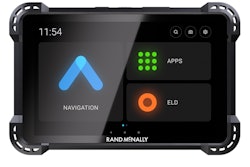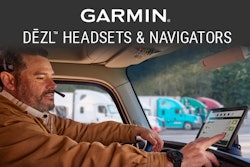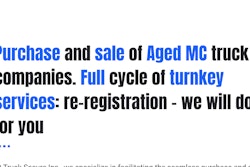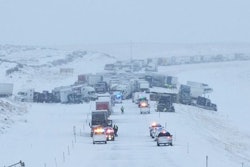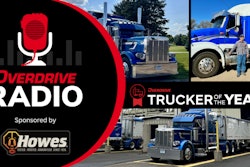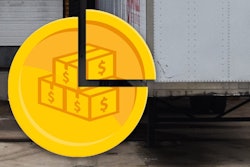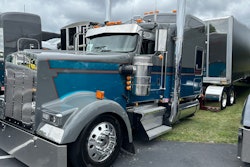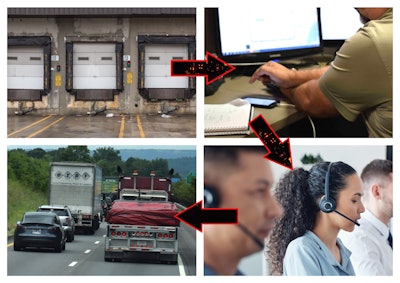
Carrier411's recent changes to its infamous FreightGuard reports sparked something of a debate about who deserves the blame in cases of double brokering. The discussion broke out in the "Impact of False Online Reviews In Trucking" session hosted by attorney Dan Artaev and Carrier Defender cofounder Sean Mathews at the Broker-Carrier Summit in Fort Worth, Texas, on Thursday, October 24, after the pair laid out a series of defensive moves for carriers in response to false FreightGuards and other reviews.
In any given situation where an extra carrier and broker entity both insert themselves into the middle of a freight transaction, legitimate brokers and carriers on either end of the transaction may well disagree on who deserves the blame. Yet the session made clear that all too often, legitimate carriers take the blame for double brokered loads in the form of a broker's FreightGuard report about the carrier or other review. It can cost a carrier 30% or more of available spot market business in some cases.
When double brokering follows from a broker's lack of due diligence, of course, there's just not an equivalent red letter a carrier can assign them.
A lively debate erupted in the Q&A after Mathews and Artaev's presentation.
Today's spot market: "legalized gambling" for new carriers. "You don’t know if you’re going to run into somebody bad who is going to shut you down, and that’s not a healthy environment for anybody."
--Carrier Defender's Sean Mathews
One broker questioned the idea of an innocent carrier in a double brokering situation. Mathews and Artaev had discussed instances where carriers fooled by sophisticated identity theft ended up bearing the brunt of bad reviews, and this broker wanted to know exactly why they should be let off the hook.
"Is there no liability to the carrier that accepted that freight from a double broker?" asked the broker. "In my opinion, brokers can’t be the only ones fighting the double broker fight. In my opinion, if a carrier accepts a load from a double broker, you have liability too, and [as a broker,] to report that" simply isn't a case of leaving bad marks for "a great carrier."
In this broker's reasoning, "if you're a good or great carrier, you're doing the vetting on your side prior to taking that load," he said. "Are you vetting the broker you're taking it from? Are you going through that rate confirmation and doing those things to recognize [double brokering] before picking up the freight?"
Attorney Artaev took a legal view of the question. "That goes right to the essence of a negligence claim," he said. "Is the carrier negligent if they did not vet the double broker?" he said, shooting the question to the broker. "You're the industry professional, would you expect that's the norm?"
The broker responded that he "absolutely" has carriers call to validate loads, to research MC numbers and even run a credit check on the broker. All of those acts represent good practice carriers can use to help avoid hauling for double brokers and/or ID thieves who would pretend to be legitimate brokers.
[Related: How to vet brokers' credit before taking a load]
Mathews, a former broker himself, responded with something of a reality check. The work of a small carrier involves every bit of safety, maintenance, load planning and administration. The work of a broker, rather, is in landing freight with shipper customers and finding good carriers to haul it. Can carriers truly be expected to effectively accept outsourcing of a big portion of a broker's job?
"You've got to be careful when you pin some of the responsibility to the carrier," he said. "I don't know what kind of freight you move, but every broker has their own rules on the rate confirmation."
Some rate cons say "never call my customer," some say "don't show up early" to the shipper, according to Mathews. Sometimes the broker says the driver needs to count the product, but they're not allowed on the dock to be able to do it.
Carriers, especially one-truck owner-operators, aren't best positioned to recognize sophisticated cyber criminals' ever-changing methods, constantly evolving to avoid detection, Mathews suggested. Rather, brokers are. Brokers swear by paying for and operating multiple suites of "carrier vetting" technology and/or participating in review platforms, but there's not as many options out there for carriers looking to vet brokers.
"Expecting carriers to memorize every broker’s preference" while dealing with brokers on the spot market "is very difficult," said Mathews. "Really the best way to" vet a broker from the carrier perspective "is to call a shipper," and confirm the broker that shipper is using, he said. But most brokers also don't want a carrier doing that. "That's not OK. Some folks might say that's back dooring," said Mathews, a reference to back solicitation of shippers, often prohibited for carriers in brokers' contracts.
It's certainly true that communication with the shipper is a carrier's likely best way to root out the reality of a double-brokered load, in addition to being a customer service necessity in many cases.
Since any broker, legitimate or not, can post a FreightGuard review that quickly becomes a permanent black mark against the carrier's MC and ultimate reputation, threatening victims of double brokering with a bad review puts them between a rock and a hard place. Mathews and Artaev said that "scumbag" brokers, after being questioned about double brokering, can and do threaten false FreightGuard reports and other reviews of carriers as a way of getting the carrier to move the load. Carriers sometimes then go along with it just to avoid losing business down the line.
The incentives to root out the double brokers and other fraudsters aren't always high on the prioritization list for "a lot of small trucking companies, even medium ones that are just running around the country trying to do a good job and just deliver stuff on-time," said Mathews. "Imagine they run into a bad broker or scumbag on the load boards -- they’re just trying not to piss them off."
Mathews compared today's spot market to "legalized gambling" for new carriers. "You don’t know if you’re going to run into somebody bad who is going to shut you down, and that’s not a healthy environment for anybody," he said.
The broker said he agreed with Mathews "for the most part," but asked "if they’re not doing their part to vet the broker, are they considered good?" That's a metric that has absolutely nothing to do with the actual trucking of goods and equipment across the country, but the broker was undeterred. Carriers "need to protect themselves and their reputation," the broker added. "That liability falls on both parties. I think it's a 50-50 split -- you need to be diligent, we need to be diligent."
"Some of the biggest busts we've seen for some of these cargo theft rings come as a result of a carrier who at some point said, 'something is not right.'"
--Cargo theft specialist Scott Cornell on the importance of truckers in the fight against fraud
Finally, a carrier took the microphone and leveled with the broker.
"Brokers work at computers," he said. "It's a very simple thing. You guys sit and work at the computer. A lot of carriers on the road don't. It's simply that the place of work is different."
Secondly, in today's market, when a carrier hears about a good load, they're incentivized to jump on it and quickly confirm, he added. The broker shouldn't expect that to last, however. When the market flips back in carriers' favor, it will be brokers searching high and low for carriers, perhaps ready to lower the bar a bit on vetting to move volume.
Also, carriers can and do vet brokers all the time, he said. Sometimes, like when you get a cold call from someone suspicious claiming to represent a major broker, "it's very easy" to vet them simply by calling the broker's main line.
But what about sophisticated forms of ID theft? What about brokers and carriers straight up selling their MC numbers to fraudsters? What about fraudsters intercepting FMCSA login credentials and changing the authority filings to show the scammer's information?
"You really need to be a tech guy to identify sometimes the ID theft," said the carrier. "Asking carriers in this market to do that, for it to be a 50 percent responsibility on due diligence ... it's just very hard."
[Related: FMCSA guidance on buying and selling MC numbers]
Scott Cornell, transportation lead and crime and theft specialist at Travelers, then took the mic. "Your point is well made," he said to the carrier. "The average carrier has never had to vet a broker until now. Cargo theft in U.S. changed fundamentally two and a half years ago" when double brokering and impersonation/ID theft schemes began a sharp rise in cargo theft incident involvement.
Brokers have long been checking carrier safety and compliance info, long enough for legacy players in the industry to have developed widely available products like Carrier411's FreightGuard system, but now carriers are literally being asked to join in the losing battle, as double brokering, other types of fraud and cargo theft only seem to grow and grow in intensity.
Yet even with the weight of carriers' growing responsibilities, it's often truckers making the most important contribution in battles against fraud and cargo theft, said Cornell. "Some of the biggest busts we've seen for some of these cargo theft rings come as a result of a carrier who at some point said, 'something is not right,' and took pictures or scanned some paperwork," then alerted authorities.
Interestingly, FMCSA's Office of Registration Director Ken Riddle sat in on the session and listened to the whole debate play out, as he's in the middle of revamping the registration system to fight fraud with increased verification measures.
[Related: Brokers' new 'carrier vetting' craze bad for trucking, carriers say]
More from the Broker-Carrier Summit:
**Inside the broker-carrier scrum at last week's summit
**How to beat brokers at their own game and win direct freight
**FMCSA gets an earful about bad brokers, enforcement from its 'worst critic'
**How to fight a FreightGuard or other negative review of your trucking company

